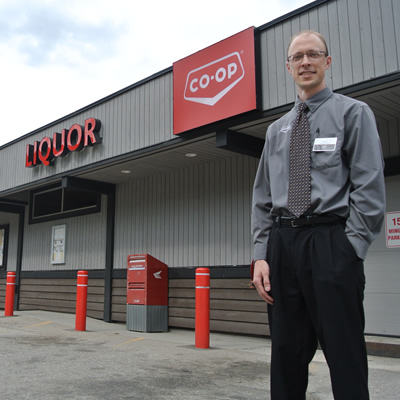To boldly go . . .
Demonstrating courage in business leadership could be just the ticket to revitalizing the Canadian economy

“While only 11 per cent of Canadian businesses can be considered truly courageous, nearly half of respondents overall (44 per cent) believed themselves to be courageous organizations.” — Can Stock Photo/halfpoint
I was recently intrigued by what to me was a new way to evaluate the success of businesses. When reviewing our most recent Membership News, a newsletter produced by Chartered Professional Account- ants Canada, I noticed an article—The Future Belongs to the Bold. The newsletter article explained: “Deloitte surveyed 1,200 Canadian business leaders to evaluate the state of courage in our businesses. This marks the first time that courage in business has been measured and its impact quantified.”
The article went on to say: “Lack of courage in business is contributing to Canada’s sluggish economy.” Deloitte’s research revealed that courageous businesses achieve greater revenue growth and create more jobs, while fearful businesses are twice as likely to experience falling revenues. Wow! This seems powerful. So I Googled it and found The Financial Post and others had commented on the Deloitte survey results and that Deloitte itself invites anyone to its website to peruse a complete review of its work and findings in regard to its philosophy on courage in business.
From Deloitte’s website I gleaned the following information on its research results and related philosophy. The information treats courage and boldness pretty much as synonyms and explains that those qualities have to relate to and be balanced with fear. They explain: “In our research, we zeroed in on five elements—five behaviours and attitudes—that are critical to courageous decision-making and action.” The five are:
Start with yourself: In business terms, this means deciding to take action—or not—despite the potential risks. However, it’s important to note that these risks must still be assessed rationally as part of the decision-making process. Courage can only exist when fear is also present.
Be provocative and challenge the status quo: Understand your company’s value proposition in its simplest form. Hone in on the core value that underlies the product or service you offer and look for opportunities to deliver that value in new and innovative ways. Seek out opposing views.
Take calculated risks: Importantly, courageous business decision-making is founded on thorough analysis and grounded in data.
Do what is right: Focus on long-term growth and market leadership. While all businesses must generate a return to cover their cost of capital, businesses that are able to focus on long-term sustainable growth are better positioned to deliver long-term value.
Unite to include: Courageous business leaders surround themselves with diverse thinkers from different backgrounds and allow all of their people to bring their authentic, whole selves to work.
This brief review of Deloitte’s project certainly encourages all entrepreneurs to evaluate their own attitudes and business philosophy. This evaluation may not be as easy as one may think as this quote from the research shows: “While only 11 per cent of Canadian businesses can be considered truly courageous, nearly half of respondents overall (44 per cent) believed themselves to be courageous organizations. Because these companies suffer from such an inaccurate self-perception, they continually fail to see the need to take corrective action . . . and fall further and further behind their competitors.”
Frank Vettese is managing partner and chief executive of Deloitte in Canada and he says, “Deloitte’s research comes at a crucial time as Canadian companies are trying to compete globally while faced with economic uncertainty at home. Canada’s recovery . . . has been slow and GDP growth remains anemic. Growth in Canada is projected at 1.3 per cent versus global GDP growth projections of more than twice that. The research shows that courage is quantifiable and it matters.”
Vettese continues: “We’ve studied a range of issues affecting the Canadian economy, and the undercurrent flowing throughout our research, whether it be on productivity or exports or preparedness for technology-driven disruption, is that Canadian businesses are deeply risk-averse” and “Until now, we were challenged to identify how companies could become bolder. Risk-taking is but one element of being courageous, but it’s a powerful means to drive growth and propel both companies and our country forward.”
Although this research data is very sobering, it is encouraging that there is hope for those who want to work hard and smart as these statistics show: “Almost three-quarters (69 per cent) of courageous businesses saw revenues rise last year, compared to less than half (46 per cent) of fearful businesses.”
So we at Koocanusa Publications Inc. wish you all the best in being courageous in your personal contribution to the business you are associated with.






Comments